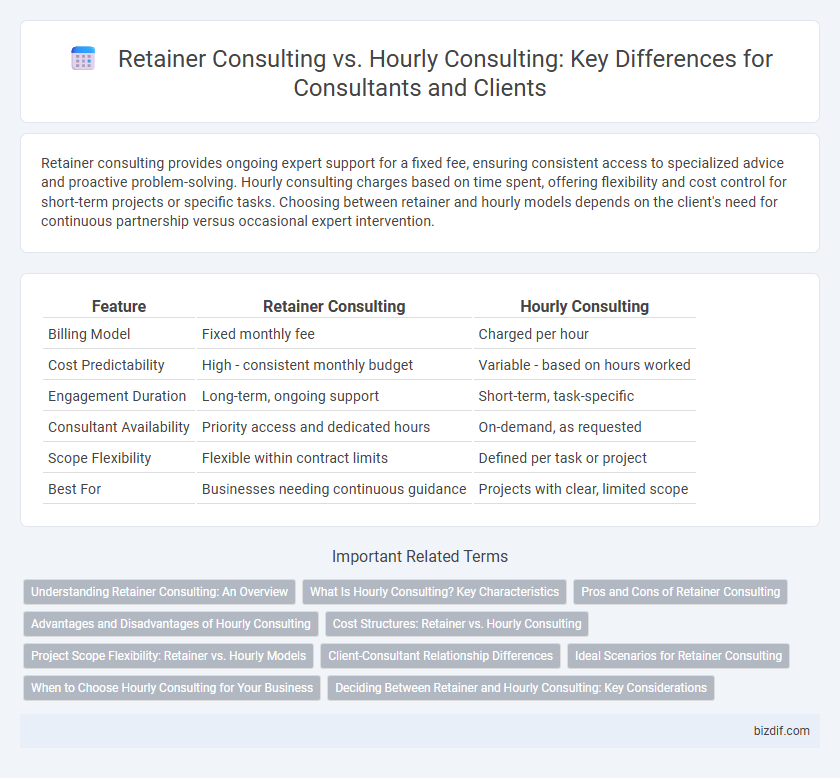Retainer consulting provides ongoing expert support for a fixed fee, ensuring consistent access to specialized advice and proactive problem-solving. Hourly consulting charges based on time spent, offering flexibility and cost control for short-term projects or specific tasks. Choosing between retainer and hourly models depends on the client's need for continuous partnership versus occasional expert intervention.
Table of Comparison
| Feature | Retainer Consulting | Hourly Consulting |
|---|---|---|
| Billing Model | Fixed monthly fee | Charged per hour |
| Cost Predictability | High - consistent monthly budget | Variable - based on hours worked |
| Engagement Duration | Long-term, ongoing support | Short-term, task-specific |
| Consultant Availability | Priority access and dedicated hours | On-demand, as requested |
| Scope Flexibility | Flexible within contract limits | Defined per task or project |
| Best For | Businesses needing continuous guidance | Projects with clear, limited scope |
Understanding Retainer Consulting: An Overview
Retainer consulting involves a client paying a fixed fee regularly to secure ongoing access to consulting expertise, ensuring priority support and consistent advisory services. This model fosters long-term partnerships, enabling consultants to develop a deeper understanding of the client's business needs and deliver tailored solutions. Unlike hourly consulting, retainers provide financial predictability and encourage strategic planning over transactional engagement.
What Is Hourly Consulting? Key Characteristics
Hourly consulting involves charging clients based on the actual time spent on tasks or projects, typically measured in hourly increments. Key characteristics include flexible engagement, transparent billing, and scalable support tailored to project demands, making it ideal for short-term or variable workloads. This model enables precise tracking of consulting hours, promoting cost control and straightforward expense management.
Pros and Cons of Retainer Consulting
Retainer consulting offers consistent access to expert advice and predictable budgeting, fostering long-term strategic partnerships that align closely with business goals. However, it may require higher upfront commitments and risks underutilization if consulting needs fluctuate, potentially leading to inefficiencies. Despite these limitations, retainer agreements provide prioritized service and better resource allocation compared to hourly consulting models.
Advantages and Disadvantages of Hourly Consulting
Hourly consulting offers flexibility by charging clients only for the actual time spent on a project, making it ideal for short-term or uncertain engagements. However, it can lead to unpredictable costs and encourages a focus on billable hours rather than outcomes, potentially reducing efficiency. Clients may struggle with budgeting while consultants face income variability, creating challenges in long-term financial planning.
Cost Structures: Retainer vs. Hourly Consulting
Retainer consulting offers a fixed monthly fee that ensures continuous access to expert advice, providing predictable budgeting and long-term strategic alignment. Hourly consulting charges clients based on actual time spent, which can lead to variable costs depending on the project's complexity and duration. Businesses seeking consistent support often prefer retainer models, while those with sporadic needs may opt for the flexibility of hourly rates.
Project Scope Flexibility: Retainer vs. Hourly Models
Retainer consulting offers greater project scope flexibility by allowing ongoing access to expert advice and adjustments as project needs evolve, without renegotiating terms for each task. Hourly consulting limits flexibility since each task is billed separately, often leading to rigid definitions of scope and additional costs if project requirements change. Clients seeking adaptable, long-term support typically benefit more from the retainer model, while those with well-defined, short-term projects may prefer hourly consulting.
Client-Consultant Relationship Differences
Retainer consulting fosters a long-term client-consultant relationship built on ongoing collaboration and trust, providing consistent access to expertise for strategic planning and problem-solving. Hourly consulting emphasizes transaction-based interactions, with clients seeking specific, short-term advice or project support and limited continuity between sessions. The retainer model enhances proactive engagement and deeper understanding of client needs, while hourly consulting suits flexible, immediate task-oriented consulting demands.
Ideal Scenarios for Retainer Consulting
Retainer consulting is ideal for businesses requiring ongoing strategic guidance, continuous support, and proactive problem-solving over an extended period, ensuring consistent access to expert advice without the need for repeated contract negotiations. Companies experiencing frequent project changes or needing regular updates benefit from retainer models to maintain flexibility and prioritize long-term goals. Organizations aiming to build a trusted advisor relationship with their consultant find retainers effective for fostering collaboration and aligning consulting efforts closely with evolving business objectives.
When to Choose Hourly Consulting for Your Business
Hourly consulting is ideal for businesses requiring flexible, project-specific expertise without long-term commitment, allowing precise budget control and payment only for actual work done. It suits short-term needs, troubleshooting, or when the scope of work is unclear, providing agility and cost efficiency. Choosing hourly consulting benefits startups, small businesses, or organizations testing new strategies needing expert input on demand.
Deciding Between Retainer and Hourly Consulting: Key Considerations
Choosing between retainer and hourly consulting depends on project scope, budget predictability, and required availability. Retainer agreements offer consistent access to consultants for ongoing support and strategic planning, while hourly consulting suits short-term or variable workloads with clear task definitions. Evaluating the complexity, duration, and flexibility needs of your consultancy engagement ensures optimal resource allocation and cost efficiency.
Retainer Consulting vs Hourly Consulting Infographic

 bizdif.com
bizdif.com